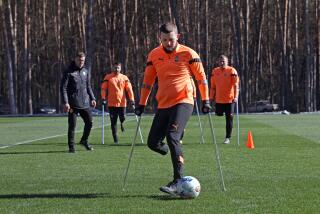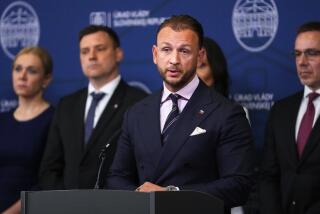From Hospital Beds, Tales of Revenge
- Share via
PRISTINA, Yugoslavia — The intensive care unit of the main hospital here was full Thursday, and the hisses, clicks and beeps of the machines that give life could not drown out an unspoken word: revenge.
The victims of revenge, along with those who sought it, lay in the six beds in the unit’s two rooms. They had come from across Kosovo in the days since international peacekeepers arrived in the province.
The North Atlantic Treaty Organization may have won its 11-week air war against Yugoslavia, but Kosovo’s Serbs and ethnic Albanians are a long way from making peace with each other.
Dr. Rade Maksimovic, a Serbian physician whose specialty is blood diseases, lay in one room of the intensive care unit with six bullet wounds to his chest, hip, arms and legs.
Ethnic Albanians wearing the uniform of the separatist Kosovo Liberation Army, or KLA, sprayed the doctor’s car with about 50 bullets Wednesday as he left the southern Kosovo city of Suva Reka, he said in an interview.
The doctor had many ethnic Albanian patients before the war and insisted that he will not run from what he sees as terrorists.
“This was the only way they could chase me from Kosovo,” the doctor said. “But I will not leave. That’s for certain.”
Unconscious Victim Symbol of Confusion
In the bed next to the wounded hematologist was Florim Imeri, a 23-year-old ethnic Albanian who the KLA said was shot by a Serb in Pristina’s Matican district on Thursday. Serbian doctors trying to save Imeri’s life, however, said British troops shot him and brought him to the hospital for treatment.
Imeri couldn’t speak for himself because he was unconscious and taking labored breaths through a powder-blue tube taped to his mouth and connected to a respirator. A gray dog tag on his heaving chest was stamped with an eagle, its wings spread, symbol of the guerrilla army.
Across the hall, an 11-year-old Kosovo Albanian boy named Bitim Iladi was recovering from a grenade blast. The boy’s uncle died beside him when the man tried to throw a grenade at retreating Yugoslav troops and it exploded in his hand, according to doctors.
Next to him was Nezir Gashi, an ethnic Albanian teenager with a knife wound in his back. A Serb stabbed him while another Serb shot to death three of his friends in Pristina on Tuesday evening, witnesses said. The youngsters had gathered outside for a game of soccer.
“God did not take my son, the Serbs did,” said Bahrije Ajeti, the mother of one of the victims, as she cried Wednesday over 19-year-old son Uran’s shrouded corpse in the family’s living room.
“The Serbs killed you on the doorstep,” she wailed, sitting on the carpet next to her dead son. “I’m sorry I can’t avenge your death.”
NATO Walks Tricky Path to Peace
In South Africa, whose long journey to majority black rule was even more tortured than Kosovo’s conflict, the government chose to break the cycle of revenge by granting amnesty to killers on all sides who confessed their crimes and apologized. The government argued that hearing the truth, and getting past the hatred, would do more for South Africa than criminal trials or revenge.
That hasn’t been offered as an option in Kosovo, where an international force of about 48,000 soldiers will try to keep the peace without saying how it can reconcile ethnic Albanians’ demands for independence with NATO’s insistence that they can’t have it--and how it will combat the lingering threat of revenge.
NATO Troops Disarm Guerrillas
As thousands of Serbs continued to flee north Thursday in long columns from Kosovo, a province of Yugoslavia’s main republic, Serbia, and reports of reprisal attacks mounted, NATO troops were more aggressive in efforts to disarm KLA guerrillas.
On Wednesday, the troops’ British commander, Lt. Gen. Mike Jackson, told Serbs in the Pristina suburb of Kosovo Polje that he will do all he can to make it safe for them to remain.
“I’m well aware that you are concerned about the so-called KLA,” he told a crowd of about 3,000 skeptical Serbs. “The United Nations Security Council resolution makes it absolutely clear that this organization is to be demilitarized.”
The guerrillas’ leaders will soon sign an agreement that will require strict steps to meet the goal of demilitarization over 30 days, he promised. But KLA hard-liners have insisted that they will not give up their demand for independence from Yugoslavia.
Like many ethnic Albanian men here in the provincial capital, Uran Ajeti and his soccer-playing friends had spent most of the war hiding in their homes to avoid Yugoslav troops, and were overjoyed just to be outside after NATO troops arrived last weekend.
But they had another reason to think things were finally going right. Two days before they were attacked, the men had started part-time jobs moving cartons of supplies for the International Committee of the Red Cross.
Witnesses to the slayings told Ajeti’s father, Xhevat, 48, that the four or five killers are Serbs living in nearby apartments and claimed they are police officers who were out of uniform.
It took about 15 minutes for a few British paratroops on foot patrol to reach the site of the shooting. About 10 minutes later, an additional 20 or 30 soldiers had taken up defensive positions, witnesses said.
Neighborhood residents led a few British soldiers to the building where they thought some of the killers lived, but they could not find the men, Ajeti’s father said.
The British are soldiers trained to fight wars, not detectives with the skills needed to solve murders, and that is why he thinks Kosovo quickly needs foreign police officers to restore law and order.
Another patient at Pristina’s main hospital, Goran Jovanovic, a 23-year-old Serb, was thumbing a ride from Pristina back home to the southeast Kosovo town of Gnjilane when three men in a Volkswagen Golf picked him up just after noon on Tuesday.
They chatted with him in fluent Serbian, griping about the fuel shortage NATO bombing had caused and making other small talk, until they reached a spot near Gracanica Lake, about 12 miles from here, Jovanovic said from his hospital bed.
One of the men pulled him from the car, and while their victim lay helpless on the ground, another man drew a long-barreled silver revolver, like a Colt, and fired a single shot at his head, Jovanovic said.
The bullet entered just in front of his right ear, leaving a neat dime-sized hole, and exited through his back. It ended up in his blue jeans, where a doctor found it.
Attacked Serbian Man Vows to Stay Put
Jovanovic is convinced that the men who shot him were not Serbs, but ethnic Albanians of the KLA.
“Neither Serbs nor Americans would do something like this,” Jovanovic said. “A Serb would never do that to a Serb.”
Jovanovic has spoken to his family, and they agreed it would be wrong for any of them to flee Kosovo in the growing exodus of Serbs, he said.
Instead, they will try to live under the protection of NATO troops, even though they cursed the alliance warplanes that bombed Kosovo and the rest of Serbia during the air war.
“We can leave, but if we go somewhere else in Serbia, we will never be able to come back,” he said. “One can always find a job. I stay here because I was born here and I don’t want anyone to burn my house.”
*
All of Paul Watson’s dispatches from Kosovo are available on The Times’ Web site at https://fold6.site./dispatch.
More to Read
Sign up for Essential California
The most important California stories and recommendations in your inbox every morning.
You may occasionally receive promotional content from the Los Angeles Times.










